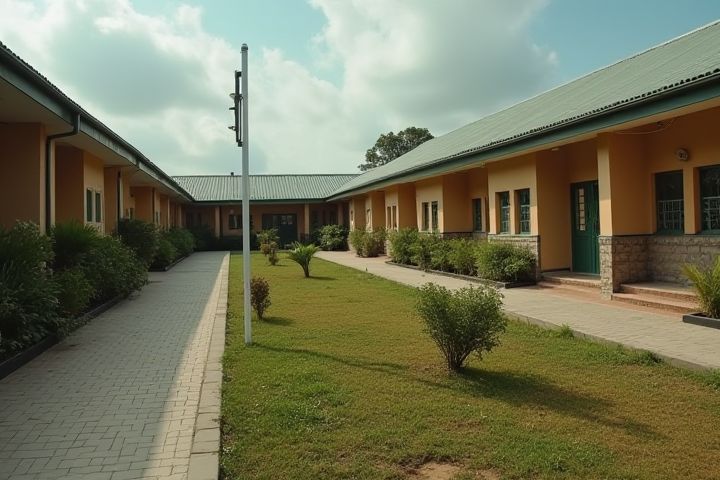
In Nigeria, high school is commonly referred to as secondary school. This educational stage typically spans six years, divided into two main cycles: junior secondary (three years) and senior secondary (three years). Students generally enroll at around age 11 and conclude their secondary education by age 17. Upon completion, students take the West African Senior School Certificate Examination (WASSCE) or the National Examinations Council (NECO) exams, which are crucial for gaining admission into tertiary institutions. Secondary schools in Nigeria can be government-run or privately owned, offering a range of curricula that often include science, arts, and vocational subjects.
Secondary School
In Nigeria, high schools are typically referred to as Secondary Schools. These institutions cater to students aged 11 to 17 years and offer a curriculum that includes subjects such as mathematics, sciences, arts, and humanities. Secondary Schools in Nigeria are crucial for preparing students for higher education or vocational training, and they usually consist of two levels: Junior Secondary School (JSS) for the first three years, followed by Senior Secondary School (SSS), which spans the final three years. Graduates often take the West African Senior School Certificate Examination (WASSCE) to qualify for tertiary education opportunities.
Junior Secondary School
In Nigeria, the Junior Secondary School (JSS) is a critical educational stage typically covering three years, starting from ages 11 to 14. This level follows the six years of primary education and serves as a bridge to Senior Secondary School. The Junior Secondary School curriculum includes subjects such as Mathematics, English Language, Sciences, and Social Studies, designed to provide students with foundational knowledge and skills. Upon successful completion, students take the Basic Education Certificate Examination (BECE), which is essential for progression to Senior Secondary School.
Senior Secondary School
In Nigeria, the term used for high school is "Senior Secondary School," which typically encompasses Grades 10 to 12. This educational stage is critical as it prepares students for higher learning institutions and vocational pursuits. The curriculum includes core subjects like Mathematics, English, and Sciences, along with electives that allow students to specialize in areas such as Arts or Technical Studies. Completion of the Senior Secondary School culminates in the Senior School Certificate Examination (SSCE), which is essential for admission into universities and other tertiary institutions across Nigeria.
Federal Government College
In Nigeria, high schools are generally referred to as secondary schools. One prominent example is the Federal Government College (FGC), a prestigious secondary school established by the Nigerian government to provide quality education to students across the country. FGCs are known for their rigorous academic standards, competitive admissions, and an emphasis on both science and arts education. These schools are equipped with facilities that support various extracurricular activities, fostering a well-rounded development for students.
State Government School
In Nigeria, high schools operated by the state government are commonly referred to as "State Government Secondary Schools." These institutions provide education to students typically aged 11 to 18, following the Nigerian education system's junior and senior secondary school curriculum. State Government Secondary Schools are funded and managed by individual state governments, ensuring adherence to the national educational standards while accommodating local needs. Students at these schools may take the West African Senior School Certificate Examination (WASSCE) upon completion, which plays a crucial role in furthering their educational and career opportunities.
Unity School
In Nigeria, high schools are commonly referred to as secondary schools, and Unity Schools represent a significant category of such institutions. Established by the Nigerian government to promote national integration, Unity Schools are federal government-owned schools designed to provide quality education while fostering unity among students from diverse cultures and backgrounds. These schools emphasize a well-rounded curriculum, including academics, sports, and cultural activities, aimed at developing students holistically. Enrolling in a Unity School offers you an opportunity to experience a diverse learning environment that enhances both academic excellence and social cohesion.
Private Secondary School
In Nigeria, private secondary schools serve as important educational institutions providing quality education and diverse curricula tailored to meet individual student needs. These schools often emphasize both academic excellence and extracurricular activities, fostering well-rounded development among students. Many private secondary schools in Nigeria adhere to international standards and may offer British or American-based curricula, preparing students for global opportunities. You can expect a smaller student-to-teacher ratio in private institutions, allowing for more personalized attention and support in your educational journey.
Day School
In Nigeria, high schools that operate on a day school system are commonly referred to as "secondary schools." These institutions typically cater to students aged 11 to 18, providing a curriculum that adheres to the guidelines set by the Nigerian education system. Secondary schools emphasize a variety of subjects, including science, arts, and humanities, preparing students for the West African Senior School Certificate Examination (WASSCE). Enrollment in these day schools often allows students to engage in extracurricular activities and community services, enhancing their overall educational experience.
Boarding School
In Nigeria, high schools that offer boarding facilities are commonly referred to as "boarding secondary schools." These institutions provide students not only with academic education but also with a structured living environment, fostering personal development and social skills. Boarding secondary schools often emphasize both academics and extracurricular activities, ensuring a well-rounded education. Parents typically choose these schools for their emphasis on discipline, as well as the provision of a stable learning environment away from home.
National Examination Council
In Nigeria, high schools are often referred to as secondary schools. The National Examination Council (NECO) is the body responsible for conducting examinations for students in these institutions. NECO administers the Senior School Certificate Examination (SSCE), which is crucial for students seeking to further their education in tertiary institutions. Your performance in the NECO SSCE significantly impacts your eligibility for university admission and other higher education opportunities in Nigeria.
